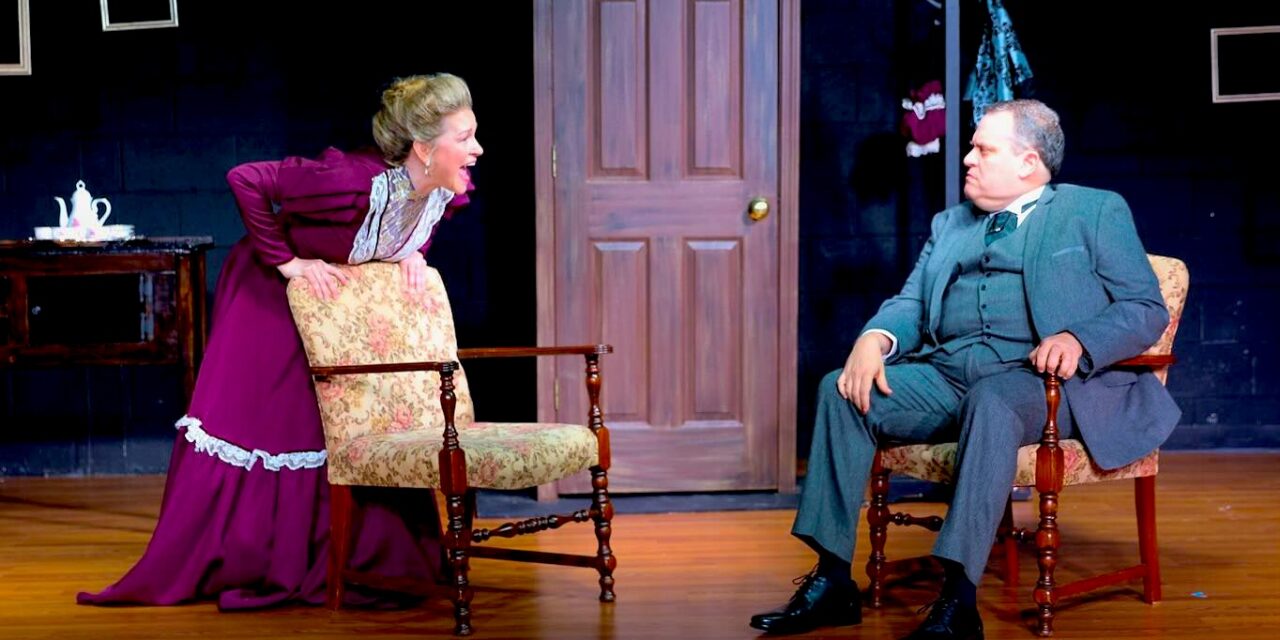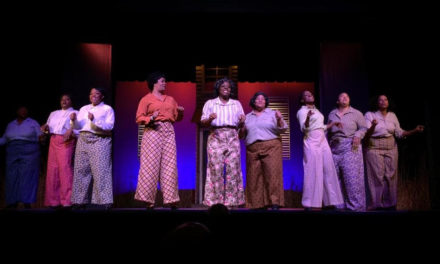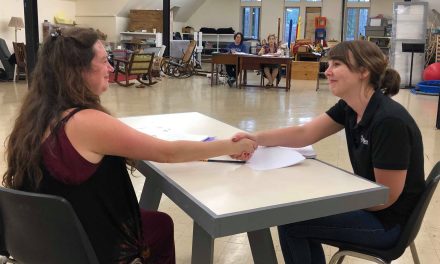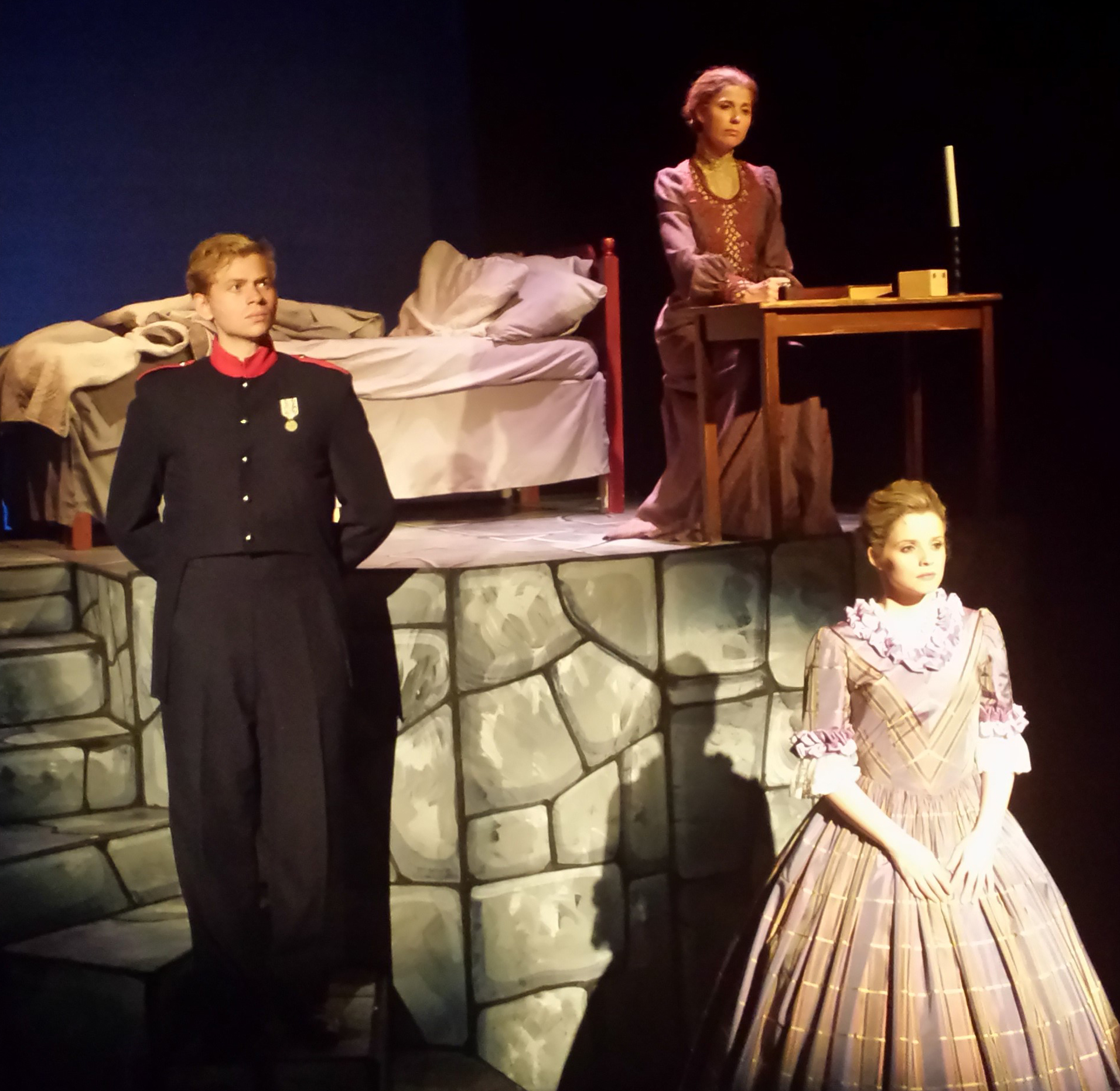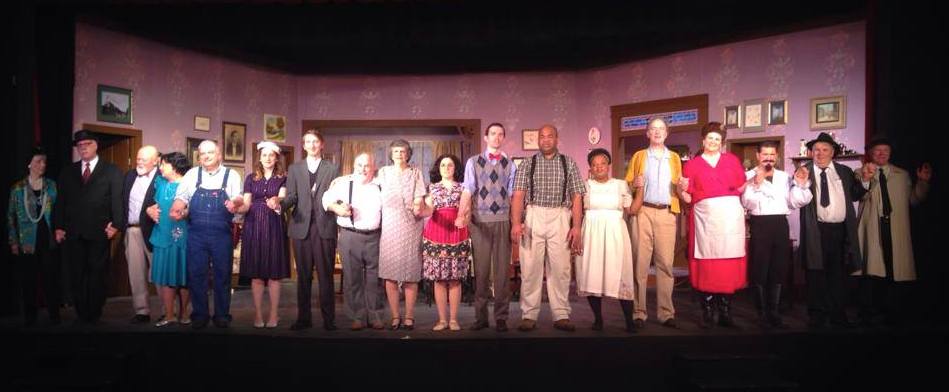Heidi Platt & Allen Platt in A Doll’s House Part 2. Photo: Wayward Actors
Vote for the 2024 Arts-Louisville Theatre Awards!
A Doll’s House Part 2
By Lucas Hnath
Directed by Taylor Clemons
A review by Keith Waits
Entire contents are copyright © 2023 by Keith Waits. All rights reserved.
Of late, I have witnessed several classic or famous theatre updates: Little Women and Dracula, both from Kate Hamill, and a bold reconceptualization of Jesus Christ Superstar. We are accustomed to some of these stories being revisited over time, but Lucas Hnath’s sequel to the great Henrik Idsen’s A Doll’s House still strikes me as the riskier project. When I first saw it in 2018 I made this observation: “The play was written more than 2 years ago, but Hnath has picked up the threads of the gender conflicts that have led to Me Too and Time’s Up with such dexterity that it plays as fully at this moment as if it were written yesterday.“
Good plays may always speak to the moment, so how does A Doll’s House Part 2 come across near the end of 2023? It played even better for me, with a game quartet of actors realizing the contemporary comedic sensibility while being highly provocative.
I kept thinking about how Nora has spent 15 years doing exactly what she set out to do, building a fulfilling, independent life as a successful writer, while Torvald, Anne Marie, and Emmy have remained grounded in traditional social roles. Torvald could not bring himself to file for a divorce (a simple matter for the man who can just DO IT, while the woman has to prove the problems with the man), while Anne Marie cannot imagine any other life than being his faithful servant and Emmy is so enthralled with the idea of marriage that she is willing to commit fraud to secure it.
I was also thinking about the possibility that Nora’s journey through that door 15 years ago and back through it now can be seen as a metaphor for the women’s movement, and the dedicated campaign to invalidate its effect, or to invalidate the effect of ALL of the social change from the 1960s and 70s (R.I.P Voting Rights Act of 1965).
The true beauty of the question is that the playwright may have never had such thoughts for the idea to be true and relevant. Artists tie into the zeitgeist without understanding that reality. Distance brings things into focus.
The formidable Heidi Platt is every inch an Ibsen woman, even if this Nora belongs to Lucas Hnath. Her performance struck me as a little “turned up” on opening night but it was undeniably electrifying, a vivid, real-time exploration of a character whose return is a high-wire act. Nora seems on a mission and very much in control when she enters the scene of the crime but Platt illustrates how profoundly the ground shifts beneath her with each encounter. It is a cliche for reviewers to cite opening night dynamics but there are times when it is a privilege to witness the fine-tuning of a performance with the final ingredient of the audience’s energy.
Anne Marie is a servant, and Rita Hight is costumed appropriately, but she palpably renders the role of surrogate mother (and wife?) that is the character’s reality. Anne Marie is also given the first confirmation through dialogue of how intentionally disconnected Hnath’s language is from the period of the original material. However good Katie Hay’s costumes are in evoking 1894, the voices of these characters are entirely contemporary, loose, and profane in a manner unfamiliar to Ibsen scholars.
Allen Platt makes Torvald the epitome of noncommittal 21st-century masculinity. Not spineless but thoroughly convinced of his patriarchal dominance personally and culturally without beating his chest. His work is content to underplay in contrast to the more forceful performance he plays against in Nora.
Finally, Tory Parker is coquettish and scheming as their daughter, Emmy. I believe the character is meant to capture the feminist/anti-feminist (?) personality that insistently mashes empowerment and traditional gender roles for the last couple of generations. It is a character that could easily be played as one-note, but Parker illuminates the wily, manipulative intelligence at its foundation.
Katie Hay dresses them all to reinforce character, and the rest of the design work is spare, mostly two chairs and a door. The door is essential. There are some nice lighting effects from Cameron Konz in the scene transitions.
Taylor Clemon’s production of A Doll’s House Part 2 illustrates a recurring theme for me reviewing Louisville theatre for so many years: sometimes the distinction between professional and anything else can be fine. Wayward has little to no budget here but a smart, hard-working cast made me think harder and deeper about this text than I had before. Challenging, engaging, and not easily resolved, it is everything I ask of theatre.
Featuring Rita Hight, Tory Parker, Allen Platt, Heidi Platt
A Doll’s House Part 2
November 9, 11, 17 & 18 @ 7:30 pm
November 12 & 18 @ 2:30 pm
Wayward Actors Company
Highview Arts Center
7406 Fegenbush Lane
Louisville, KY 40206
Keith Waits is a native of Louisville who works at Louisville Visual Art during the days, including being the host of Artists Talk with LVA on WXOX 97.1 FM / ARTxFM.com, but spends most of his evenings indulging his taste for theatre, music and visual arts. His work has appeared in LEO Weekly, Pure Uncut Candy, TheatreLouisville, and Louisville Mojo. He is now Managing Editor for Arts-Louisville.com.

